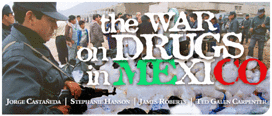Lead Essay
In his lead essay, Jorge Castañeda observes that the consequences of the U.S. drug war fall unevenly on Mexico. The U.S. taste for drugs — and for prohibition — are the chief causes of drug-related crime in Mexico, he asserts. This creates a problem that Mexico cannot solve on its own. U.S. assistance has been insufficient, and Mexican resources are too few to take on the drug cartels effectively. Even if the resources were available, the militarization of life in Mexico would be politically unacceptable to most Mexicans, who have enjoyed a relatively tranquil military in contrast to many other Latin American countries. Another approach to the war on drugs would simply be decriminalization, but again, Mexico cannot unilaterally decriminalize, because it would face severe diplomatic consequences from the United States and possibly become a refuge for addicts. The United States must lead the way toward solving this problem, which is of its own making.
Response Essays
Stephanie Hanson suggests that decriminalizing drugs, and possibly legalizing marijuana, is a promising strategy for reducing drug-related violence. Yet she acknowledges that coordination problems exist between the United States and Mexico on this issue, and she suggests that a second-best option may be to enforce stricter controls on guns leaving the United States and heading to Mexico.
James Roberts faults Prof. Castañeda for taking the easy way out: Drug legalization might not be much work for the elites, but it will ruin lives and degrade regional democracies. It won’t stop violence and may even increase it. The United States and Mexico should work together to fight Mexican drug cartels because the survival of the Mexican state is at stake, along with American lives and American morals. Mexico in particular needs to step forward, reform its corrupt government and enforcement agencies, and get its own house in order, rather than seeking U.S.-based solutions.
Ted Galen Carpenter commends Jorge Castañeda for recognizing the nature of the problem that besets his country, but he suggests a more radical solution: As long as U.S. prohibition remains in place, he writes, violent criminals will dominate the trade in narcotics. Only ending prohibition can solve the international problems of the drug trade. Militarization of enforcement simply escalates the violence and corruption, because the cartels have enough money to bribe and/or fight their way through any escalation we’d be prepared to mount.
The Conversation
Related at Cato
» Policy Analysis: Troubled Neighbor: Mexico’s Drug Violence Poses a Threat to the United States by Ted Galen Carpenter
» Blog Post: Gun Control for the Sake of Mexico: The Meme that Wouldn’t Die by David Rittgers
» Podcast: A Failed Drug War in Mexico by Doug Bandow

